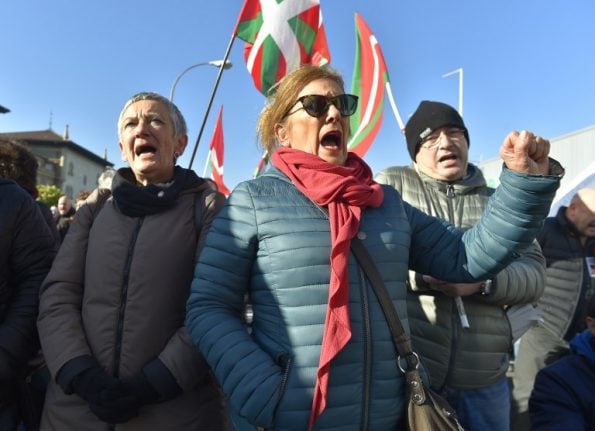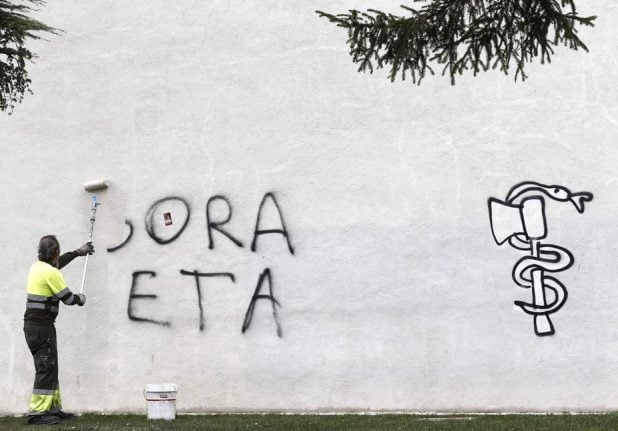After coming to power in June a month after ETA disbanded, Spain's Socialist Prime Minister Pedro Sanchez pledged to start reversing an official policy of keeping them scattered across Spain, hundreds of kilometres away from home.
But the conservatives and some of the relatives of the estimated 853 ETA victims fiercely resist this, arguing prisoners should first repudiate the group before they can be allowed closer, which few have done.
Prisoner relatives retort that now ETA is gone, moving them to the Basque Country would help their gradual reintegration in a society where a majority of people and parties are in favour anyway.
And so the dilemma continues.
Just 19 transfers
“We think it's possible to bring all prisoners to Zaballa (Basque jail) and that they start reintegration processes there,” says Teresa Toda of the Social Forum, a group campaigning on behalf on the prisoners.
Currently, 265 people are in prison over their links to ETA, 46 of whom are in France and one in Portugal, says Urtzi Errazkin of Etxerat, an association of prisoner families.
The rest are in Spain with very few in the Basque Country, he adds.
Since Sanchez's announcement, 19 have been or are in the process of being transferred closer to home, a spokeswoman for Spain's prison authority told AFP.
But only two were sent to the Basque Country after repudiating ETA as part of a government-led reintegration process already in place.
Not good enough, says Toda, who herself spent six years in jail.
Deputy-director of Egin, a pro-independence Basque newspaper that was closed down in 1998, she was accused of collaborating with ETA, which she denies.
Kept under the most severe “first degree” regime — like a vast majority of ETA prisoners — she was only allowed out of her cell four hours a day.

Protesters hold a banner saying “Release prisoners”. Photo: AFP
And the victims?
Spanish law recommends that authorities avoid “socially uprooting convicts” but authorities implemented the policy of keeping ETA prisoners far from home to try to weaken the organisation.
That forces many relatives to travel hundreds of kilometres — at times every week — to see them, with all the cost and potential road accidents that implies, says Errazkin.
“They're using the suffering of relatives to take revenge on the prisoners,” he tells AFP.
And the victims?, retorts Consuelo Ordonez, head of the Covite victims' association.
“I have to travel 1,200 kilometres every time I want to go see my brother in his grave” in the Basque resort of San Sebastian, she says angrily.
Her brother Gregorio, a Basque lawmaker, was killed by ETA in 1995 and she herself was so threatened that she was forced to leave the region.
Her association is against transferring prisoners to the Basque Country if they haven't first repudiated ETA and apologised to victims, which few have done.
Especially given that Madrid has said it is open to giving the Basque regional government, which already has autonomy in a wide range of areas, control over prison management.
Ordonez fears the nationalists may be too lenient towards prisoners in the Basque Country.

Basque society in favour
But much of Basque society is in favour of bringing them closer, activists and opinion polls show.
Many acknowledge that ETA wreaked death and destruction but that there were also victims on the other side from anti-ETA death squads, far-right groups or police, accused of torture.
“Much of what we see is 'I don't care where they serve their sentence as long as justice is done',” says Toda.
In its biannual poll published in December, the Basque Deusto University found that 34 percent of those surveyed were in favour of bringing ETA prisoners closer compared to just seven percent for dispersion.
A further 29 percent were for granting amnesty to all or some of them.
For Ordonez, that hurts.
“That's the society that applauded when ETA killed us, justified it, passed on information or looked the other way,” she says.
People holding Basque flags demonstrated in December outside Basauri jail near Bilbao for the release of ETA-linked prisoners — but some relatives of the group's victims strongly oppose detainees being brought closer to home
Spanish Prime Minister Pedro Sanchez has pledged no longer to keep prisoners jailed for ETA activities scattered across Spain to aid social reintegration — but conservatives and some victim's relatives say they should first repudiate their crimes
The Basque resort of San Sebastian drew a large demonstration in October of people under the slogan “human rights, solution, peace, now the prisoners” as part of efforts to persuade the Spanish government to hold ETA prisoners closer to their homes
Protesters lit flares and held a banner urging freedom for sick prisoners during a December 31 rally outside Bilbao with 265 ETA-affiliated prisoners currently held in Spain, France and Portugal.




 Please whitelist us to continue reading.
Please whitelist us to continue reading.